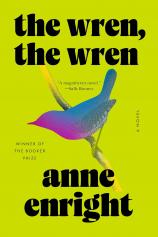The Wren, the Wren
Review
The Wren, the Wren
In a brief author’s note, Anne Enright explains that part of the genesis of her latest novel came from a conversation she had with a fellow writer (male, of course) years earlier: “‘My wife got sick,’ he explained, almost incidentally, ‘And we split up.’” A version of that same conversation appears in THE WREN, THE WREN, but in this case, it’s a staged conversation between two men in one of those Charlie Rose–style televised interview shows from the early 1980s. During the segment, noted Irish poet Phil McDaragh talks about his late ex-wife. They “lived together in Dublin for some time he said, but she got sick, unfortunately, and the marriage did not survive.”
"THE WREN, THE WREN feels in some ways like an Irish author taking stock of her country’s tradition of revering a certain type of poet, and imagining her way into what that poet’s undeniable talent might be occluding about other aspects of his life."
This seemingly offhand anecdote lands differently with Phil’s daughter, Carmel, and his granddaughter, Nell, than it does with the general public. More than anyone, Carmel is aware of the havoc that ensued at that time, when she was still young and living at home with her mother --- who was dying of breast cancer --- and her older sister, Imelda. In Carmel’s memory, it wasn’t simply that “the marriage did not survive”; it was that her father left her mother abruptly, leaving chaos and despair in his wake.
As she grows up, Carmel reacts to this formative trauma by leading a life of rigid conformity --- keeping a (too) close eye on Nell and, when she dates at all, entering a relationship with a man whose dullness continues to perplex and confound her. Nell, in turn, feels a little like Phil’s legacy reborn. Like her grandfather, whom she never really knew, she has the eye of an artist and a wandering soul; she is the one, when she flees Carmel’s grasp and an emotionally and sexually abusive relationship, who fulfills Phil’s injunction to turn her “infinite gaze to the masters of the Uffizi” as part of a trip across Europe, financed through house-sitting.
It's clear that Carmel rightfully resents Phil for his abrupt absence just when his family needed him most, and for her mother’s accelerated decline and the eventual falling-out with Imelda over the estate. But neither she nor Nell can entirely fault Phil. As the rest of the world continually reminds them, he is a truly significant poet, an important figure in Irish letters (as that interview reveals, Phil himself is fully aware of this).
As for Phil’s voice and perspective, we see it in only one short but memorable narrative section about his boyhood and how he channeled his earlier zeal to become a priest into poetry instead, after suffering the twin tragedies of humiliation and a broken heart. But we also hear Phil’s voice in his poems that punctuate the narrative sections and echo their themes.
The novel’s structure is dynamic, shifting fairly rapidly between Nell and Carmel’s perspectives and across moments in their lives, culminating in Carmel’s realization that Nell is finally, if not entirely mature, at least an adult worthy of respect and consideration. Enright’s prose is lyrical and striking, with moments of genuine humor, violence and cruelty --- often between characters who are unexpected, making these incidents even more unsettling.
THE WREN, THE WREN feels in some ways like an Irish author taking stock of her country’s tradition of revering a certain type of poet, and imagining her way into what that poet’s undeniable talent might be occluding about other aspects of his life.
Reviewed by Norah Piehl on September 29, 2023
The Wren, the Wren
- Publication Date: August 27, 2024
- Genres: Fiction
- Paperback: 284 pages
- Publisher: W. W. Norton & Company
- ISBN-10: 1324076038
- ISBN-13: 9781324076032




